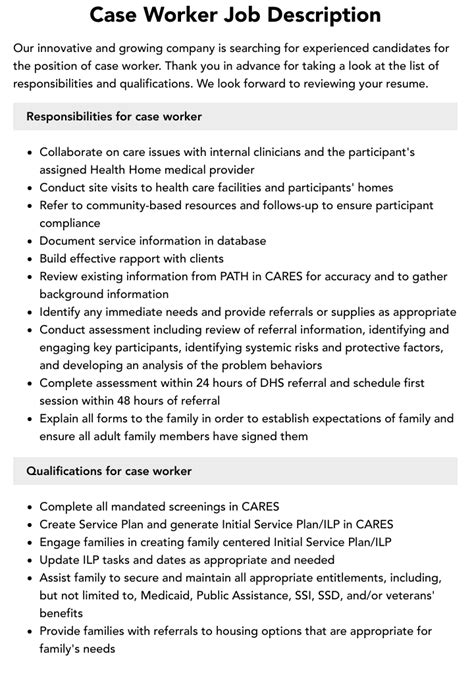What Is A Caseworker

A caseworker is a dedicated professional who plays a vital role in supporting and assisting individuals or families facing various challenges and difficulties. They work closely with their clients to provide guidance, resources, and advocacy, aiming to improve their overall well-being and quality of life. Caseworkers are often employed by social service agencies, non-profit organizations, government departments, or healthcare facilities, and their work is crucial in addressing social issues and promoting positive change.
The Role and Responsibilities of a Caseworker

Caseworkers undertake a wide range of responsibilities, tailored to the specific needs of their clients. Here are some key aspects of their role:
- Assessments: Caseworkers conduct comprehensive assessments to understand their clients' circumstances, needs, and goals. This involves gathering relevant information, evaluating the client's situation, and identifying areas where support is required.
- Care Planning: Based on the assessment, caseworkers develop individualized care plans. These plans outline the steps, services, and resources needed to address the client's issues effectively. Care plans are collaborative efforts, created in consultation with the client and other professionals involved.
- Resource Referrals: One of the primary functions of a caseworker is to connect clients with appropriate resources and services. This may include referrals to healthcare providers, mental health professionals, legal aid, housing assistance, employment services, and more. Caseworkers ensure that their clients receive the support they need to overcome their challenges.
- Advocacy: Caseworkers act as advocates for their clients, ensuring their rights are respected and their voices are heard. They navigate complex systems, such as healthcare or legal processes, on behalf of their clients, helping them access the services and support they are entitled to.
- Emotional Support: Providing emotional support and guidance is an essential part of a caseworker's role. They offer a listening ear, empathy, and encouragement to their clients, helping them cope with difficult situations and make positive life changes.
- Follow-up and Monitoring: Caseworkers maintain regular contact with their clients, providing ongoing support and monitoring their progress. They ensure that the care plan is being effectively implemented and make adjustments as needed.
- Documentation and Reporting: Accurate documentation is crucial in casework. Caseworkers maintain detailed records of their interactions, assessments, and progress. These records are essential for reporting to supervisors, funding bodies, and other stakeholders, ensuring transparency and accountability.
Skills and Qualities of Effective Caseworkers

To excel in their role, caseworkers possess a unique set of skills and qualities. Here are some key attributes that contribute to their success:
- Empathy and Compassion: Caseworkers must have a deep understanding of human emotions and the ability to connect with their clients on a personal level. Empathy allows them to build trust and provide the necessary support and guidance.
- Active Listening: Active listening is a vital skill for caseworkers. They need to pay close attention to their clients' stories, concerns, and needs, ensuring they fully understand the situation before offering solutions or advice.
- Problem-Solving Abilities: Caseworkers encounter complex situations and must be adept at finding creative solutions. They should be able to think critically, analyze information, and develop effective strategies to address their clients' challenges.
- Cultural Sensitivity: Working with individuals from diverse cultural backgrounds requires cultural sensitivity. Caseworkers must be aware of and respectful towards different cultural practices, beliefs, and values, ensuring their support is tailored to each client's unique needs.
- Time Management: Caseworkers often juggle multiple cases and responsibilities. Effective time management skills are essential to ensure that each client receives the attention and support they deserve.
- Ethical Conduct: Maintaining ethical standards is crucial in casework. Caseworkers must uphold confidentiality, respect their clients' autonomy, and act in their best interests at all times.
- Resilience and Self-Care: The work of a caseworker can be emotionally demanding. Resilience and self-care practices are necessary to prevent burnout and maintain a healthy work-life balance.
The Impact of Caseworkers

The work of caseworkers has a profound impact on the lives of their clients. By providing support, resources, and advocacy, caseworkers empower individuals and families to overcome challenges and improve their circumstances. Some of the key impacts include:
- Improved Well-being: Caseworkers help clients access the necessary services and support, leading to improved physical, mental, and emotional well-being. This can include better access to healthcare, mental health support, and assistance with basic needs such as housing and food.
- Increased Self-Sufficiency: Through guidance and resource referrals, caseworkers enable their clients to become more self-sufficient. They empower individuals to develop the skills and confidence to navigate complex systems and make positive life choices independently.
- Enhanced Social Connections: Caseworkers often facilitate social connections and community engagement. By connecting clients with support groups, community organizations, and peer networks, they help individuals build a support system and reduce feelings of isolation.
- Advocacy for Change: Caseworkers not only advocate for their individual clients but also contribute to broader social change. By addressing systemic issues and working towards policy reforms, they play a crucial role in creating a more equitable and supportive society.
The Diverse Fields of Casework

Caseworkers operate in various fields, each with its unique challenges and focus. Here are some common areas where caseworkers make a difference:
- Child Welfare: Caseworkers in child welfare agencies work to protect the well-being of children. They investigate reports of abuse or neglect, provide support to families, and ensure that children receive the care and services they need.
- Mental Health: Mental health caseworkers assist individuals struggling with mental health issues. They provide support, connect clients with appropriate treatment, and help them manage their symptoms effectively.
- Substance Abuse: Caseworkers in substance abuse treatment centers support individuals struggling with addiction. They help clients access treatment programs, provide counseling, and offer resources for long-term recovery.
- Disability Services: Caseworkers in disability services agencies assist individuals with physical or intellectual disabilities. They help clients access support services, advocate for their rights, and ensure they receive the accommodations and assistance they require.
- Refugee and Immigrant Services: Caseworkers working with refugees and immigrants provide essential support during the resettlement process. They assist with language barriers, cultural adjustment, legal matters, and accessing community resources.
The Importance of Collaboration

Caseworkers often work as part of a multidisciplinary team, collaborating with other professionals to provide comprehensive support to their clients. Effective collaboration ensures that clients receive holistic care and that all aspects of their well-being are addressed. Some key collaborators include:
- Healthcare Professionals: Caseworkers may work closely with doctors, nurses, and other healthcare providers to ensure their clients receive the necessary medical care and treatment.
- Mental Health Specialists: Collaborating with mental health professionals, such as psychologists and counselors, is crucial for addressing clients' mental health needs.
- Social Workers: Social workers and caseworkers often work hand-in-hand, sharing knowledge and expertise to provide comprehensive support to individuals and families.
- Legal Professionals: In cases involving legal matters, such as custody battles or housing disputes, caseworkers may collaborate with lawyers or legal aid organizations to ensure their clients' rights are protected.
- Community Organizations: Caseworkers often partner with community organizations, charities, and non-profits to access additional resources and support for their clients.
Challenges and Rewards of Casework

The role of a caseworker comes with its own set of challenges and rewards. Here are some key aspects to consider:
Challenges:
- Emotional Demands: Casework can be emotionally demanding, as caseworkers often work with individuals facing difficult circumstances. It is essential to practice self-care and maintain a healthy work-life balance.
- Complex Cases: Some cases may present unique challenges or involve complex issues. Caseworkers must be prepared to adapt their approaches and collaborate with experts to find effective solutions.
- Confidentiality and Ethics: Maintaining confidentiality and adhering to ethical guidelines is crucial. Caseworkers must balance their clients' privacy with the need to share information for the client's well-being and safety.
Rewards:
- Making a Difference: One of the most rewarding aspects of casework is the opportunity to make a tangible difference in people's lives. Seeing clients overcome challenges and achieve their goals is incredibly fulfilling.
- Building Relationships: Caseworkers often develop strong relationships with their clients, which can be deeply rewarding. The trust and connection built over time can lead to meaningful and lasting impacts.
- Professional Growth: Casework offers continuous learning and professional development opportunities. Caseworkers can expand their knowledge, skills, and expertise through ongoing training and experience.
Conclusion and Final Thoughts

Caseworkers are dedicated professionals who play a crucial role in supporting individuals and families facing various challenges. Their work involves a holistic approach, addressing the physical, mental, and emotional well-being of their clients. By providing guidance, resources, and advocacy, caseworkers empower their clients to overcome obstacles and improve their lives. The impact of caseworkers extends beyond individual clients, as they contribute to creating a more compassionate and supportive society.
What qualifications are required to become a caseworker?
+The qualifications required to become a caseworker can vary depending on the field and location. Generally, a bachelor’s degree in social work, psychology, sociology, or a related field is preferred. Some positions may require a master’s degree or specialized certifications. It is essential to check the specific requirements for the role and the regulations in your area.
How long does it take to become a caseworker?
+The time it takes to become a caseworker depends on your educational path and the specific requirements of the role. On average, it can take around 4-6 years to complete the necessary education and training. This includes obtaining a bachelor’s degree and potentially pursuing further studies or certifications.
What are the career prospects for caseworkers?
+The career prospects for caseworkers are diverse and promising. With experience and further education, caseworkers can advance into supervisory or management roles within social service agencies or non-profit organizations. They can also specialize in specific fields, such as child welfare, mental health, or disability services, allowing for more focused and advanced practice.
How can I find caseworker job opportunities?
+There are several ways to find caseworker job opportunities. You can start by searching online job boards and career websites specific to social work or social services. Additionally, networking within the field, attending industry events, and reaching out to local social service agencies can provide valuable connections and potential job leads.
What are some common challenges faced by caseworkers?
+Caseworkers often face challenges such as high caseloads, limited resources, and complex client needs. They may encounter resistance or lack of cooperation from clients, and they must navigate ethical dilemmas and confidentiality issues. Additionally, caseworkers need to manage their own well-being and avoid burnout while providing support to others.


